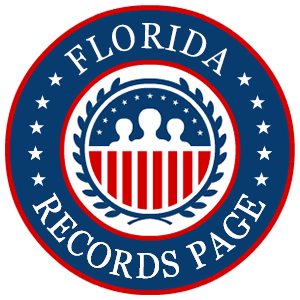Access free Florida arrest records and criminal records today. Look up vital information in any and every county through official channels using the links and steps outlined in this brief resource.
Florida is well-known for it’s broad public record laws that allow news outlets, journalist, and others to find bizarre information that would typically be restricted in other states. This is, in part, why the term “Florida man” came to life across the internet and, for better or worse, allows arrest and Florida criminal records to be accessed with ease.
The following guide outlines various local, state and federal agencies that host public criminal record repositories, and the process to look through each, from arrests, warrants, probation and parole, to background checks and the sex offender registry.
In addition, this resource will cover how to bail someone out of jail, expunge and seal records, find state and federal prisoners, and review laws and statutes that govern the use of criminal records in Florida.
Criminal & Arrest Records: Availability & Accessibility in Florida
Both Florida arrest records and criminal records are accessible by the public through various means, but accessing each type of record requires a slightly differing process through different record custodians.
There are a few exceptions to public availability or records being only partially disclosed; these include those involving active criminal intelligence information, active criminal investigative information, juvenile records, and any reports that have been sealed or expunged.
All federal public records requests must adhere to Florida’s FOIA laws, including the Florida Open Meetings Law, which states that all meetings of government officials must be open to the general public.1
Additionally, the Florida Sunshine Law asserts that interested parties may access all public records within the state except for federal records that have been deemed non-public and personal emails involving city employees on government computers.2 Records requests may be made without a stated reason.
To see what other types of records are in the public index, check out the Florida public record lookup resource which provides more information on vital records (marriage, divorce, birth and death records), court records, prisoner records – the guide also covers criminal and arrest information but isn’t as depth as the information below.
What Appears on Criminal Records vs Arrest Records in Florida
An arrest report in Florida is often less detailed than criminal records because it only contains information about circumstances and details surrounding a particular arrest rather than giving a full criminal history.
Alternatively, criminal records hold information about the entire court proceedings and, eventually, will show if the individual was innocent or proven guilty.
Florida arrest records often include:
- Last Name/First Name
- Race/Ethnicity
- Height
- Weight
- Sex
- Date of Birth
- Hair Type/Color
- Eye Color
- Arrest Information (Arresting Agency, Date, Charge, Bond Type & Amount, Location)
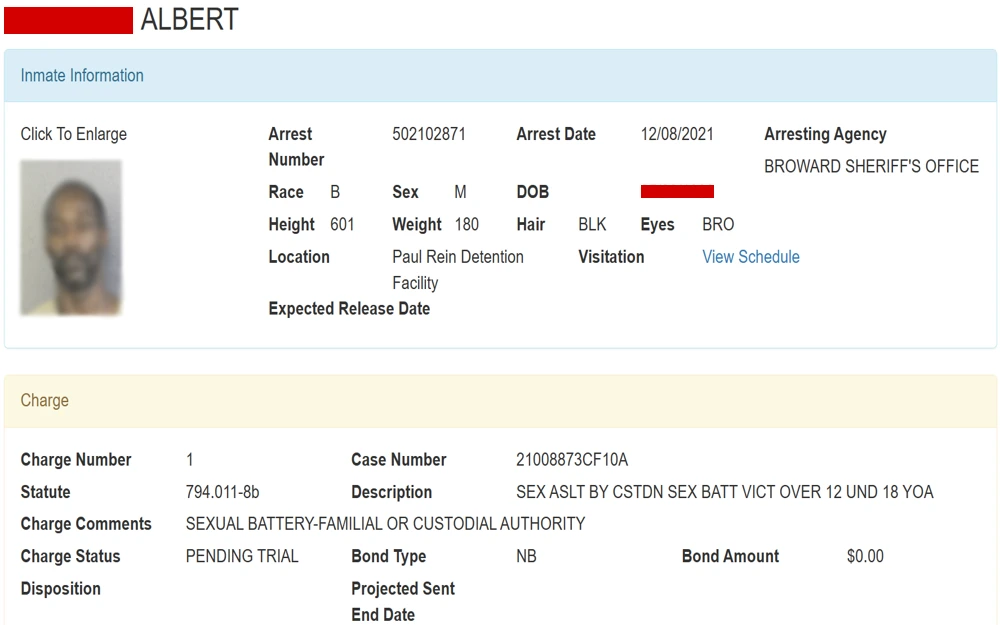
Florida criminal records tend to cover the following:
- Last Name, First Name, Known Aliases
- Race/Ethnicity
- Height
- Weight
- Sex
- Date of Birth
- History of Arrests
- Prior Convictions (Unless Sealed or Expunged)
- Mugshot
How To Determine if Someone Is in a Florida Jail & the Reason Why
Searchers wanting to access Florida arrest records or find recent arrests should know the subject’s name, the area where the subject was arrested, and, ideally, the approximate time of the arrest.
Knowing which law enforcement agency made the arrest can also be helpful, although it’s not always necessary.
Individuals curious about how to find recent or current arrests in Florida can do so without any cost associated by calling or visiting the local sheriff department or police department where the arrest was made or–even more conveniently–by searching the their websites as these often have inmate searches and arrest records viewable by the public in an online database.
The table below contains a link to every county’s online inmate search tool, their phone numbers, and whether or not they show mugshots.
Check Arrest Records in Florida via Inmate Rosters & Mugshot Databases from County Sheriffs’ Offices
Figuring out how to find out if someone was arrested requires knowledge of their last known whereabouts, as well as their name and approximate time or date of arrest.
With many counties having a high number of arrests, having information that narrows down a search can expedite the process and narrow down the results.
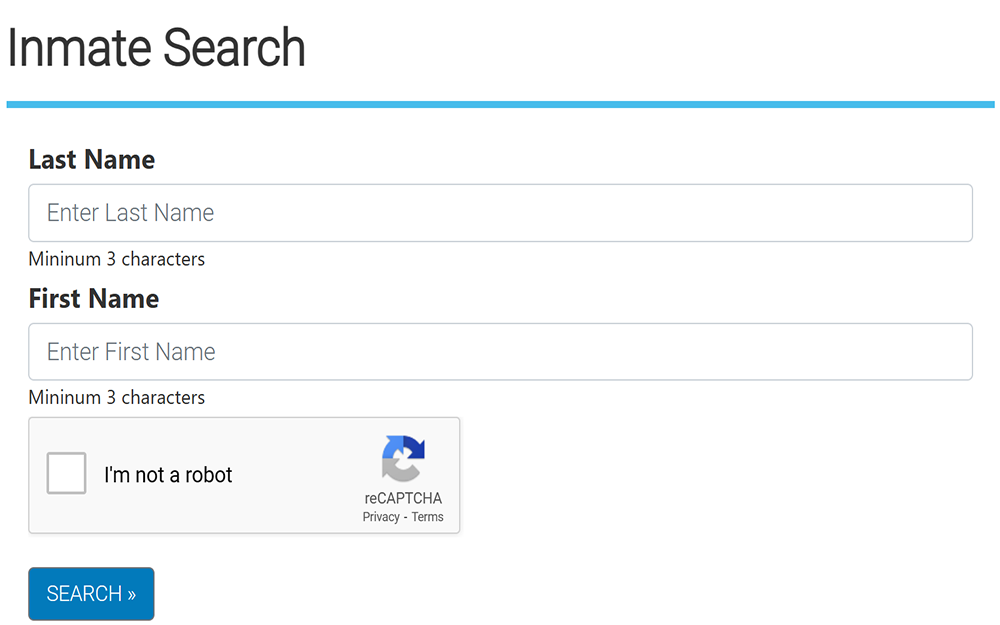
Additionally, smaller counties may not have an online search tool or a compiled list of who’s in jail; in these cases, it’s more likely that the county will only provide contact information instead of a booking list or online search option.
Florida county jails and sheriff’s offices can be reached via the contact information found below or the websites accessed instead for online searches (if available):
Below are the Florida counties that do not have an online inmate search tool or mugshot repository; each county without this resource is listed with their contact information and a link to the sheriff department contact page.
- Baker County Sheriff 904-259-2231
- Dixie County Sheriff 352-498-1220
- Gilchrist County Sheriff 352-463-3410
- Gulf County Sheriff 850-227-1115
- Holmes County Sheriff 850-547-3681
- Jackson County Sheriff 850-482-9624
- Jefferson County Sheriff 850-997-2523
- Lafayette County Sheriff 386-294-1222
- Liberty County Sheriff 850-643-2235
- Martin County Sheriff 772-220-7000
- Osceola County Sheriff 407-348-1100
- Union County Sheriff 386-496-2501
- Wakulla County Sheriff 850-745-7100
While the information above details every county inmate roster or contact information, searchers can also follow these steps to access online arrest reports in any Florida county:
- Google “[Name of County] Sheriff’s Department”
For example, a searcher wanting to find arrest records in Brevard County, FL, would type “Brevard County Sheriff’s Department” into the Google search bar. - Review the Google search results to find the official sheriff’s website (example.gov)
Using the above example, the searcher would click Brevard County Sheriff’s Department website3 - Click the link
- Explore the site for a tab about inmates (i.e. inmate search, inmate locator, etc.)
- Click the inmate search tool
On the Brevard County Sheriff Department website, the user would click “Arrest Inquiries” and be brought to the Brevard County inmate search3, 4 - Type the subject’s first and last name or other relevant information
For this example, “John Smith” was typed into the search tool - Review search results for desired information or record
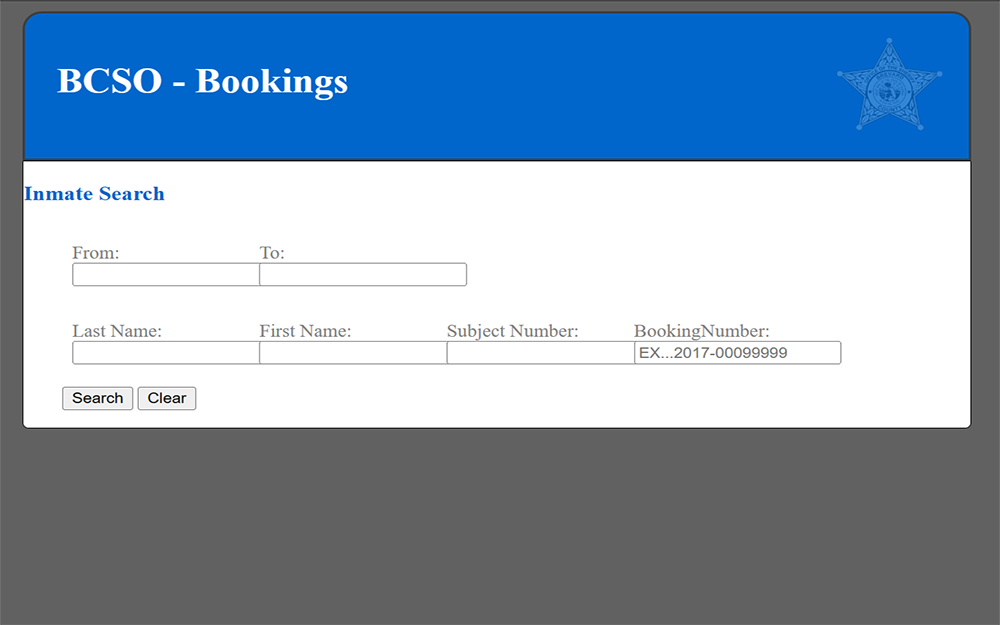
How To Contact & Post Bail for Someone Who’s Been Arrested in Florida
Since there is not a city or county inmate phone system like at the state level in Florida, individuals hoping to contact jail inmates should reach out to the jail directly to ask about inmate contact information and in person visiting hours.
At the state level, however, there is an inmate telephone system that’s dedicated to connecting Florida inmates with their loved ones or others outside of the jail.5
The inmate phone system is operated by ConnectNetwork GTL, where interested parties should create an account in order for inmates to be able to contact them.6 Friends and family members can pay online after creating an account by phone at 866-732-9098 or via the GTL app on either the Apple Store or Google Play Store.
While creating the account itself is free, GTL provides inmates with two free 5-minute calls monthly, and then the remaining calls must be prepaid or paid to collect.
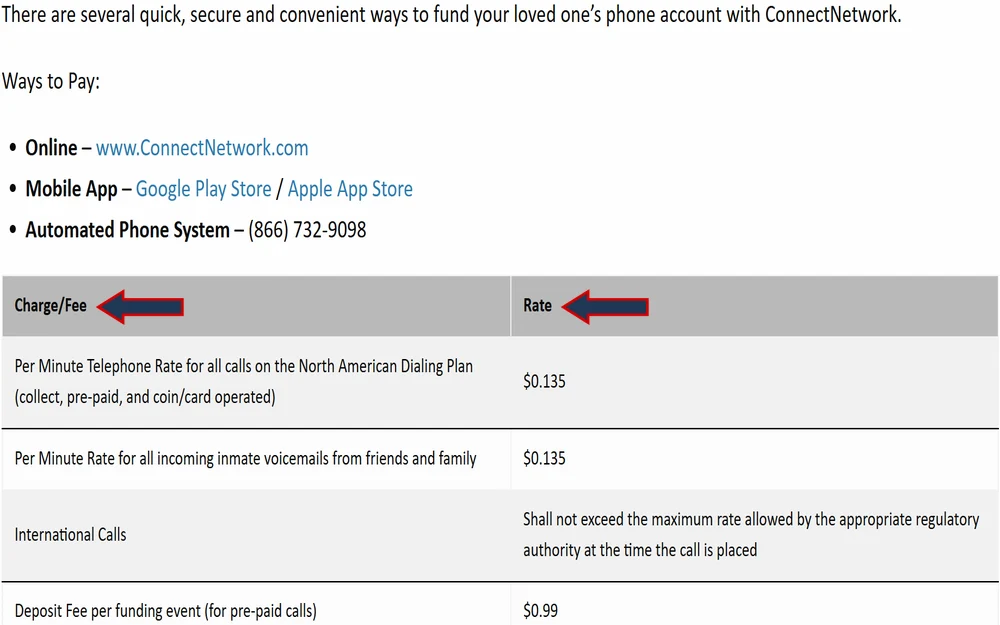
County jail inmates must adhere to the jail’s visitation hours and calling rules, but inmates in state facilities can also be contacted by mail; individuals must send mail to the central processing facility, where it will be scanned for electronic distribution instead of paper mail (excluding legal mail and privileged mail).
Bail (the monetary amount set by the court which must be paid to grant an individual pre-trial release) must be paid to the jail where the inmate is being held, upon which the detainee should be released within a few hours.
Those who cannot afford the full amount of bail can opt to recruit a bail bond agent who essentially pays bail on the inmate’s behalf. Bail bond agents usually charge at least a 10% deposit.
How To Check Someone’s Criminal History & Run a Florida Criminal Record Search
State records are often hosted by county courts or state agencies and can usually be accessed via the court of clerks if all else fails. However, the specific record custodians vary from state to state, so those searching for Florida criminal records must know where to look.
Additionally, an online directory is often available through the state agency responsible for public records to aid in efficient searches. Third-party people finder sites may also prove helpful as these can be more comprehensive but are not always fully up to date.
View Florida Criminal Records Through County Clerks of Court
In most states, criminal records are open for public review via either the county courthouse or clerk of court. In Florida, these records are held, maintained, and dispersed by each county’s clerk of the court and members of the public can inquire with the applicable clerks to access or obtain certain records.
By contacting the clerk either by phone or in person, searchers can view or request copies of these records:
| County Court Criminal Records Search | Courthouse Address | Phone Number |
| Alachua County | 201 E. University Ave. Gainesville, FL 32601 |
352-374-3636 |
| Baker County | 339 E Macclenny Ave. # 113, Macclenny, FL 32063 |
904-259-8113 |
| Bay County | 300 E. 4th St. Panama City, FL 32401 |
850-747-5102 |
| Bradford County | 945 N. Temple Ave. Starke, FL 32091 |
904-966-6280 |
| Brevard County | 51 Nieman Ave #100 Melbourne, FL 32901 |
321-637-5413 |
| Broward County | 201 SE 6th St. Fort Lauderdale, FL 33301 |
954-831-6565 |
| Calhoun County | 20859 Central Ave. Blountstown, FL 32424 |
850-674-4545 |
| Charlotte County | 18500 Murdock Cir. Port Charlotte, FL 33948 |
941-743-1400 |
| Citrus County | 1540 N Meadowcrest Blvd. Crystal River, FL 34429 |
352-341-6424 |
| Clay County | 825 N Orange Ave. Green Cove Springs, FL 32043 |
904-284-6302 |
| Collier County | 2335 Orange Blossom Dr. Naples, FL 34109 |
239-252-2745 |
| Columbia County | 173 NE Hernando Ave. Lake City, FL 32055 |
386-758-1342 |
| DeSoto County | 115 E Oak St. Arcadia, FL 34266 |
863-993-4876 |
| Dixie County | 214 NE Hwy 351 Cross City, FL 32628 |
352-498-1200 |
| Duval County | 501 W Adams St. Jacksonville, FL 32202 |
904-255-2000 |
| Escambia County | 190 W Government St. Pensacola, FL 32502 |
850-595-4310 |
| Flagler County | 1769 E Moody Blvd. Bunnell, FL 32110 |
386-313-4400 |
| Franklin County | 33 Market St #203 Apalachicola, FL 32320 |
850-653-8861 |
| Gadsden County | 10 E Jefferson St. Quincy, FL 32351 |
850-875-8601 |
| Gilchrist County | 112 S Main St #1004 Trenton, FL 32693 |
352-463-3170 |
| Glades County | 500 Avenue J Moore Haven, FL 33471 |
863-946-6010 |
| Gulf County | 1000 Cecil G. Costin Sr. Blvd. Port St Joe, FL 32456 |
850-229-6112 |
| Hamilton County | 207 NE First St. Room 106 Jasper, Florida 32052 |
386-792-1288 |
| Hardee County | 417 W Main St. Wauchula, FL 33873 |
863-773-4174 |
| Hendry County | 25 E. Hickpochee Ave. SR 80 Corner SR 29 |
863-675-5217 |
| Hernando County | 20 N Main St. Brooksville, FL 34601 |
352-754-4201 |
| Highlands County | 590 S Commerce Ave. Sebring, FL 33870 |
863-402-6830 |
| Hillsborough County | 419 N Pierce St. Tampa, FL 33602 |
813-276-8100 |
| Holmes County | 201 N Oklahoma St. Bonifay, FL 32425 |
850-547-1100 |
| Indian River County | 1801 27th St. Vero Beach, FL 32960 |
772-226-3100 |
| Jackson County | 4445 Lafayette St. Marianna, FL 32446 |
850-482-9552 |
| Jefferson County | 1 Courthouse Cir. Monticello, FL 32344 |
850-342-0218 |
| Lafayette County | 120 W Main St. Mayo, FL 32066 |
386-294-1600 |
| Lake County | 550 W Main St. Tavares, FL 32778 |
352-742-4100 |
| Lee County | 2075 Dr Martin Luther King Jr Blvd. Fort Myers, FL 33901 |
239-533-5000 |
| Leon County | 301 S Monroe St #100 Tallahassee, FL 32301 |
850-606-4000 |
| Levy County | 310 School St. Bronson, FL 32621 |
352-486-5266 |
| Liberty County | 10818 NW, FL-20 Bristol, FL 32321 |
850-643-2215 |
| Madison County | 125 Range St # 106 Madison, FL 32340 |
850-973-1500 |
| Manatee County | 1115 Manatee Ave W. Bradenton, FL 34205 |
941-749-1800 |
| Marion County | 110 NW 1st Ave #1 Ocala, FL 34471 |
352-671-5604 |
| Martin County | 100 SE Ocean Blvd. Stuart, FL 34994 |
772-288-5576 |
| Miami-Dade County | 73 W Flagler St. Miami, FL 33130 |
305-275-1155 |
| Monroe County | 500 Whitehead St. Key West, FL 33040 |
305-295-3130 |
| Nassau County | 416 Centre St. Fernandina Beach, FL 32034 |
904-491-6430 |
| Okaloosa County | 1940 Lewis Turner Blvd. Fort Walton Beach, FL 32547 |
850-651-7200 |
| Okeechobee County | 312 NW 3rd St. Okeechobee, FL 34972 |
863-763-2131 |
| Orange County | 425 N Orange Ave. Orlando, FL 32801 |
407-836-2000 |
| Osceola County | 2 Courthouse Sq. Kissimmee, FL 34741 |
407-742-3500 |
| Palm Beach County | 205 N Dixie Hwy West Palm Beach, FL 33401 |
561-355-2996 |
| Pasco County | 7530 Little Rd. New Port Richey, FL 34654 |
352-521-4274 |
| Pinellas County | 545 1st Ave N. St. Petersburg, FL 33701 |
727-464-7000 |
| Polk County | 255 W Church St. Bartow, FL 33830 |
863-534-4000 |
| Putnam County | 410 St Johns Ave. Palatka, FL 32177 |
386-326-7600 |
| St. Johns County | 4010 Lewis Speedway St. Augustine, FL 32084 |
904-819-3600 |
| St. Lucie County | 250 NW Country Club Dr. Port St. Lucie, FL 34986 |
772-871-7200 |
| Santa Rosa County | 4025 Avalon Blvd. Milton, FL 32583 |
850-981-5554 |
| Sarasota County | 2000 Main St. Sarasota, FL 34237 |
941-861-7400 |
| Seminole County | 101 Eslinger Way Sanford, FL 32773 |
407-665-4300 |
| Sumter County | 215 E McCollum Ave. Bushnell, FL 33513 |
352-569-6600 |
| Suwannee County | 200 Ohio Ave S. Live Oak, FL 32064 |
386-362-0500 |
| Taylor County | 108 N Jefferson St. Perry, FL 32347 |
850-838-3506 |
| Union County | 55 W Main St #1654 Lake Butler, FL 32054 |
386-496-3711 |
| Volusia County | 101 N Alabama Ave. DeLand, FL 32724 |
386-736-5915 |
| Wakulla County | 3056 Crawfordville Hwy Crawfordville, FL 32327 |
850-926-0905 |
| Walton County | 31 Coastal Centre Blvd. Santa Rosa Beach, FL 32459 |
850-267-3066 |
| Washington County | 1293 W Jackson Ave #100 Chipley, FL 32428 |
850-638-6009 |
How To Find Criminal Records Using the Florida Department of Law Enforcement Instant Criminal History Search (Obtain Copies Too)
Florida criminal records are managed by the Florida Department of Law Enforcement (FDLE) as part of the state’s Division of Criminal Information Services (CJIS).7
The FDLE is responsible for both maintaining and providing criminal history information access to the general public if requested, but they do charge a $24 search fee per request along with a $1 upcharge for credit card processing. These instant criminal history searches must be paid with debit or credit.8
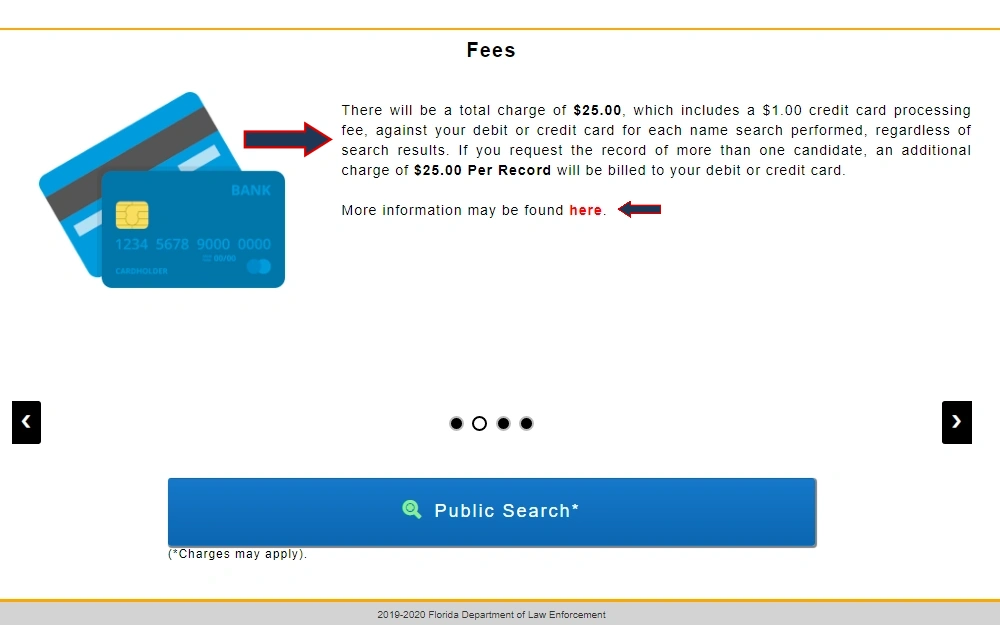
The online instant criminal history searches are not certified but are the most common and can be performed easily by following these steps:
- Go to the Instant Criminal History Search Request Form and fill out the information on all 6 pages, beginning with billing details.9
- Pay the $25 total fee and submit the request form electronically (This fee is charged for every search whether or not the search is successful)
- Enter demographic information for the subject in question, including name, race, sex, and date of birth (The more detailed and accurate the search, the more accurate the results will be)
- The FDLE online criminal history service will immediately return a list of potential matches most similar to the search results entered, up to 5 matches.
- Results may be emailed to oneself or printed after being reviewed by the requester.
Any questions related to criminal records searches should be directed to the Criminal History Services Section of the FDLE at 850-410-8161 between 9 a.m. and 4 p.m. EST Monday-Friday.
Aside from the instant search option, a Florida Criminal History Record Check can also be obtained via a(n):10
- Certified/Non-Certified Search–Requesters give demographic information, and the FDLE conducts the search, then mails notarized records to the requestors within 7 business days. Non-certified searches done through this process take no more than 5 business days, but both types cost the same as instant online results ($25 including the $1 processing fee, paid by debit or credit only)11
- Originating Agency Identification (ORI) Search–Requesters who present a valid ORI and pay the search fee (which varies depending upon the agency) will have search results sent to the recipient.12
How To Determine if Someone Is on Probation or Parole in Florida
Individuals unsure of whether to perform a FL probation search or look through parolee databases in Florida should be aware that probation usually refers to a release from jail while parole references a release from prison, but unfortunately, most states–including Florida–do not have a statewide lookup tool.
However, the Florida Department of Corrections’ Office of Community Corrections supervises nearly 150,000 offenders throughout the state who have been released on parole, conditional release, or conditional medical release, as well as offenders on probation.
Concerned parties seeking information on probation or parole details in Florida can use the Office of Community Corrections’ probation services web page, which shows community corrections regions and circuits and an interactive map that can be used to access and contact regional or circuit offices.13
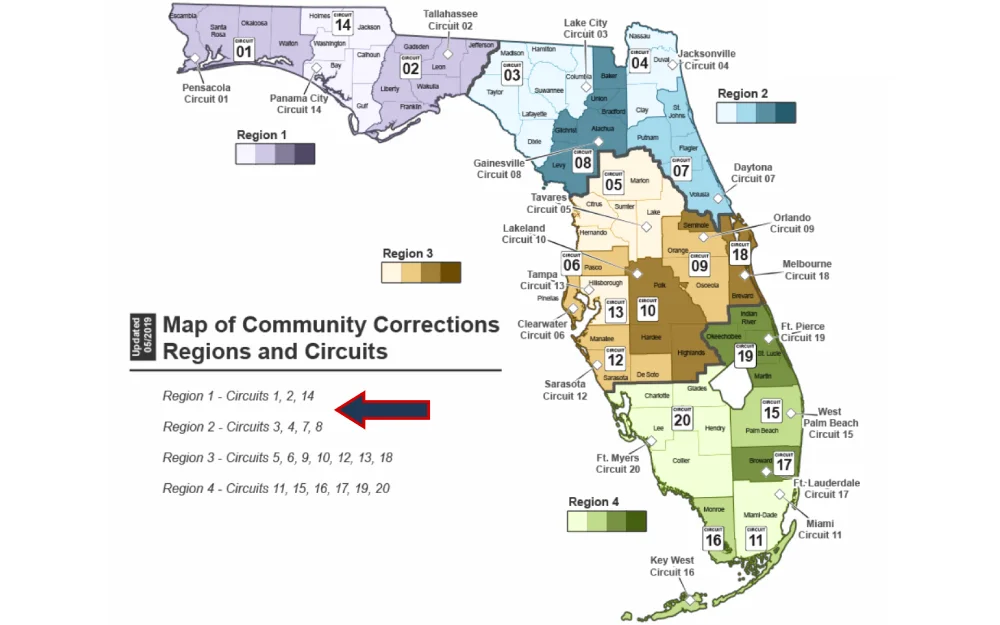
For example, users who click on “11” will be brought to the Miami Circuit Office informational page, which shows:
- All Miami Circuit Office Locations
- Circuit and Deputy Circuit Administrators
- Community-Based Sanctions & Programs
- Contact Information
- Counties Served
- Directions to the Circuit Office
- General Information
- Location
- Number of Offenders Currently Under Supervision14
To illustrate just how many people are on probation and parole, the following image shows the combined total of probationers and parolees in Florida, along with their ethnicities. Furthermore, these totals are also compared to the number of individuals on community supervision (including probation and parole) in other states across the United States.
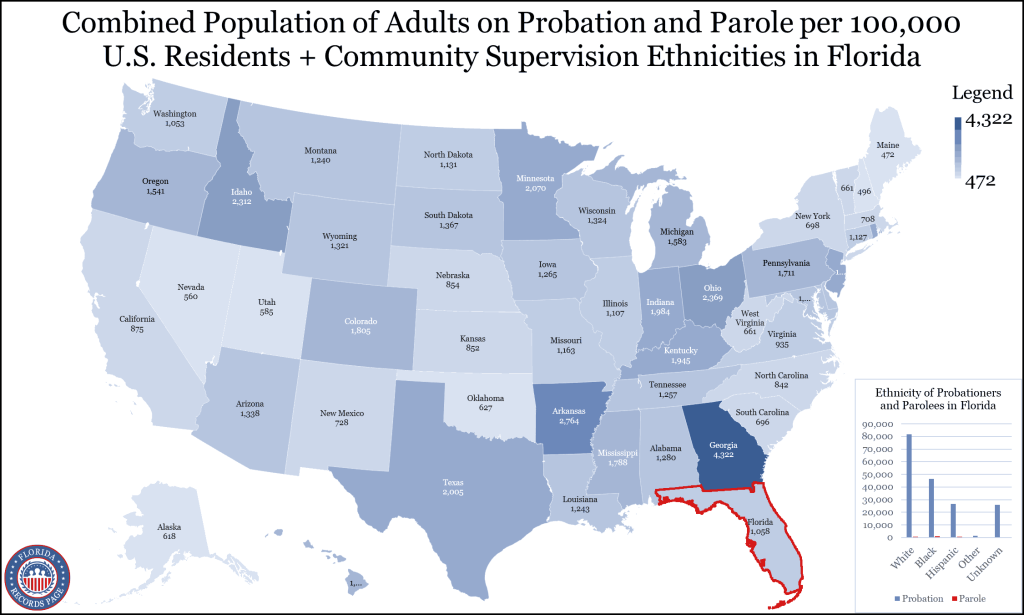
The Federal Bureau of Prisons website also offers historical information and records for subjects who were in federal prison, and the sex offender registry can be searched for probation or parole information, too. Other options for finding such information include running a personal background check on the individual in question, reviewing criminal records via the local county courthouse, or directly contacting probation or parole offices to ask about an individual.15
Searchers should keep in mind that neither the BOP nor sex offender registry will prove current probation but may show prior probationary periods for federal or sexual crimes.
Process To Seal or Expunge Criminal Records in FL
In Florida, the process for sealing vs expunging criminal records is very similar, whereas other states require completely different processes for each.
The seal and expunge process in Florida often takes at least 3 months, so individuals should know how to accurately complete each step of the process for the most efficient results.16
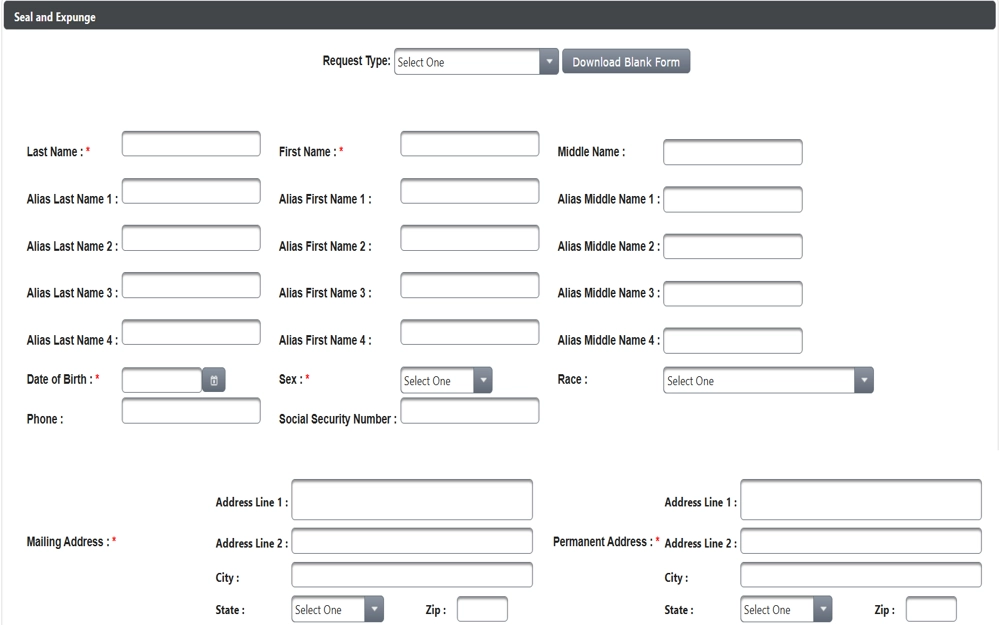
Individuals hoping to seal or expunge their records in the state of Florida should do the following:
- Fill out Section A of the FDLE’s Application for Certification of Eligibility and sign the application in the presence of a notary public to receive a notarized affidavit.17 Mark whether the application is for early juvenile expunction, an expungement, juvenile diversion, lawful self-defense, or to have a record sealed.
- Visit a local law enforcement agency or other authorized entity to obtain an official FDLE-approved fingerprint card.
- Request a certified copy of the case disposition in question from the local Clerk of Courts. (Applicants requesting to have their records sealed can skip to step 5)
- Applicants seeking expungement must submit their Application for Certification of Eligibility and court-certified case disposition to the local State Attorney’s office, where they will fill out Section B to verify that the case in question was dismissed.17
- Submit the fingerprint card, the notarized Application for Certification of Eligibility, a cover letter, certified case disposition, and a $75.00 money order or cashier’s check written to the Florida Department of Law Enforcement for the processing fee.17
- Wait for a determination; the FDLE gives 12-week processing estimates for a determination of eligibility, but wait times are done on a first-come, first-served basis and processing times have been known to take up to 9 months since the wait is entirely dependent upon the backlog of applications.
Note that if a Certification of Eligibility is granted, the record is not yet sealed or expunged. - If determined eligible, the next step is for requesters to file a petition to seal or expunge in the court with jurisdiction over the arrest or record in question, as the relevant court has the full and final say over all sealing and expungements.
The petition must be accompanied by both the Certificate of Eligibility to Seal or Expunge, the required affidavit that verifies eligibility, and a proposed order to seal and expunge the applicable record(s). - The applicant must serve both the Office of the State Attorney and the arresting law enforcement agency with a copy of the petition, the proposed order and all relevant court filings.
- If the Office of the State Attorney is in opposition to the petition, a hearing will occur to determine approval or denial of the record(s) to be sealed or expunged.
- If approved, the Court will instruct all criminal justice agencies and the clerk of courts to seal or expunge the record(s) in question and copies of the court order will be given to the defendant, state, and applicable agencies.
Juvenile criminal records held by the FDLE will be automatically expunged when the subject reaches age 21 unless committed to a juvenile correctional facility, in which case the automatic expungement age is 26–as long as certain conditions are fulfilled.
Automatic sealing is also performed if the local Clerk of the Court provides the FDLE with a certified disposition; however, these will only be sealed at the state–not local–level.
How To Locate Someone in a Florida State Prison or Federal Facility
The Florida Department of Corrections (FDC) manages the 128 facilities throughout the state and offers inmate information that the public can access.18
To find information on federal prisoners, interested parties can use the FDC’s online Offender Search tool to search for a subject by name or Department of Corrections (DC) number.19
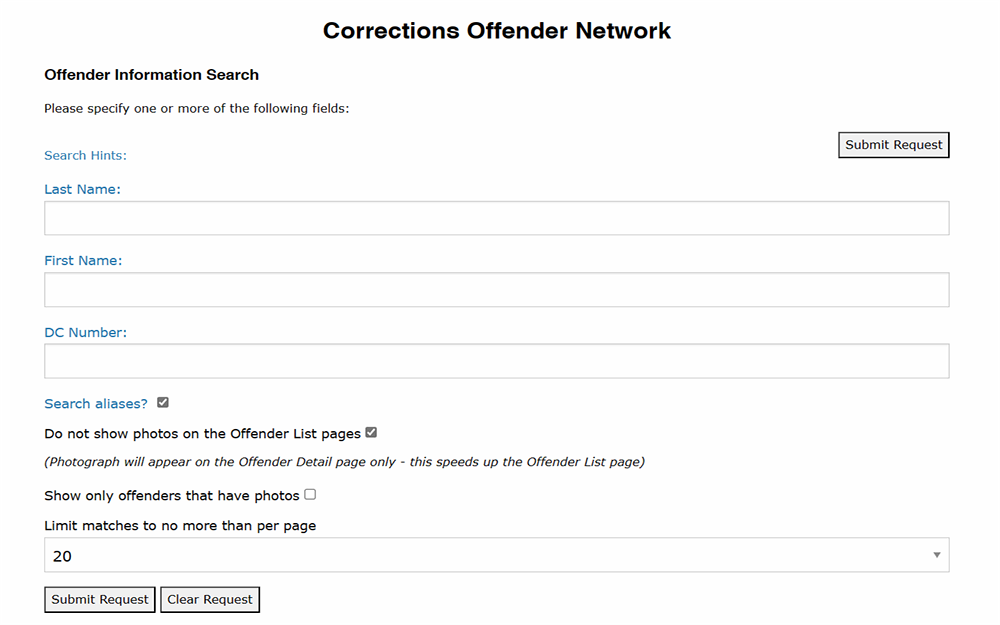
Information on each search result will include the following, if available:
- Case Number
- Current Custody
- Current Facility
- Current Release Date
- Date of Birth
- Date of Detainment
- Department of Corrections Number
- Incarceration History
- Known Aliases
- Length of Prison Sentence
- Name
- Offense Date
- Offense Description
- Prior Prison History
- Race
- Sex
Visiting request forms and applications for visitation are also available on each offender’s page.
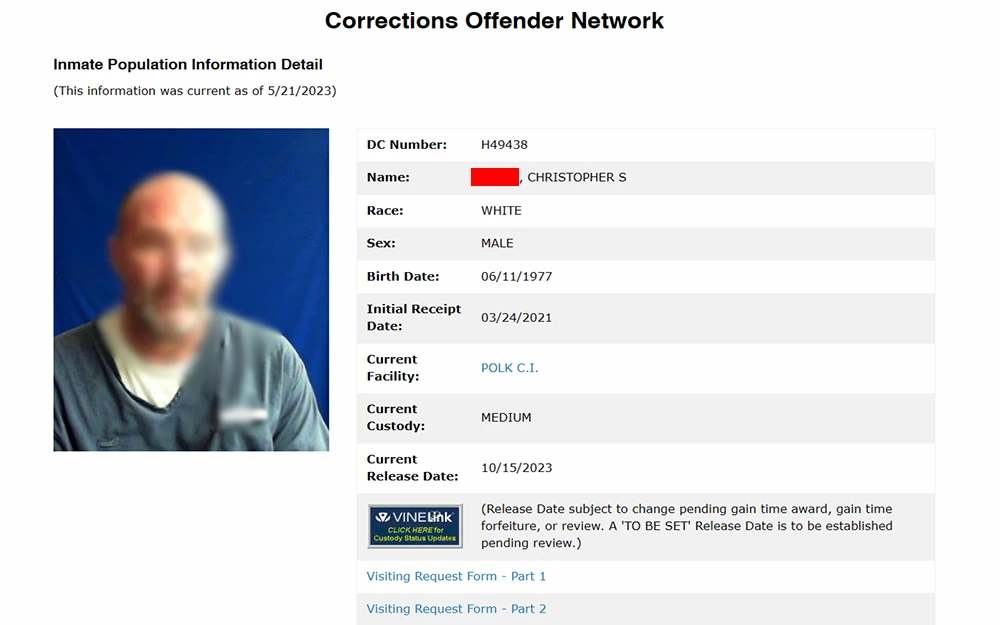
As another option, the Federal Bureau of Prisons can also provide federal prisoner information via their Federal Bureau of Prisons inmate search tool.15, 20
How To Check Whether You or Someone Else Has a Warrant in Florida
Anyone can search for warrant details on anybody wanted in Florida by following the guidance below.
Citizens interested in checking if they or someone else has a warrant out for their arrest may check through the FDLE’s Public Access System (PAS).21
Searchers can use this database to find a warrant list or information about wanted subjects for free; however, the FDLE acknowledges that warrant information may not be current, complete, or active and that interested parties should inquire with local law enforcement for confirmation.
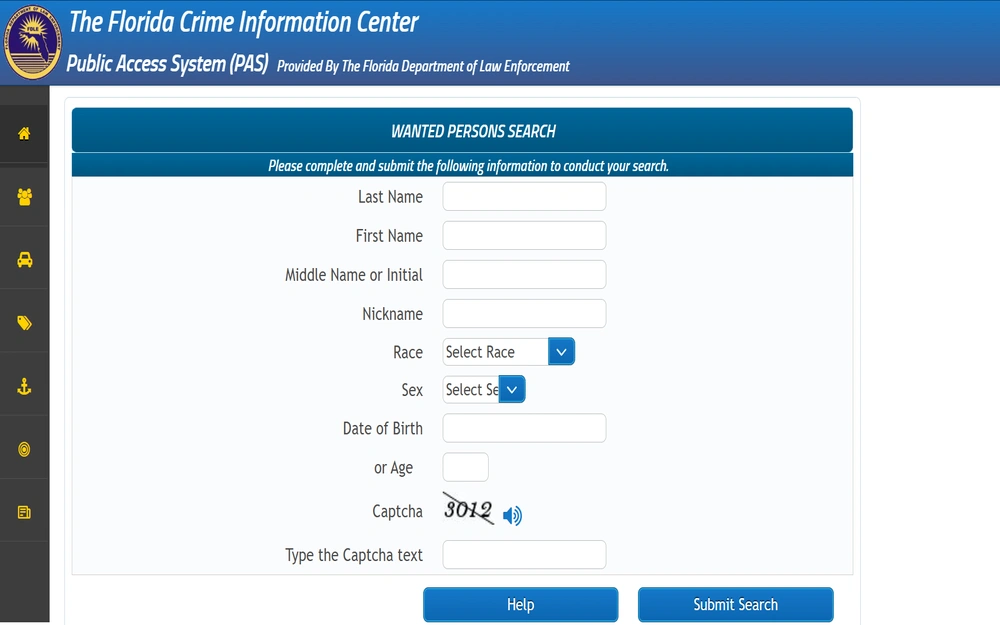
- County Clerk of Court inquiries
- Contacting the Sheriff’s Office or reviewing the sheriff department’s online database
- Utilizing third-party search sites
Note that it’s always recommended to check with local law enforcement agencies as a first step by the courts, and third-party sites can also provide further details. Additionally, if someone has a warrant out for their arrest and visits one of these agencies in person, they may be detained on the spot.
A Synopsis of Florida Background Checks
Background checks are commonly used by Florida employers, firearms dealers, landlords, and many other purposes.
Even adoption agencies and security clearance checks often rely on these checks to ensure compliance with state and federal laws as well as assessing risk level through reviews of criminal history, prior education, credit history and even an individual’s character.
In most states, there are three levels of background checks, but in Florida, there are only two types. Level 1 background checks are name-based and results show employment history and local and state criminal history, as well as if the individual is a registered sex offender.
Level 2 background checks are more comprehensive and in-depth, as they span across a national scale instead of being limited to Florida alone.
These also rely on fingerprinting for accuracy and give much more information on the applicant or individual being assessed, such as previous residences, employment and credit history, criminal records and activity, incarceration records, marital status, and more. Interested parties should be aware that Florida is the only state that defines level 1 and 2 background checks this way in their legislature.
This type of extensive background check is usually reserved for certain government employees, healthcare professionals, security guards, and employees applying to work directly with children or the elderly.
Level 2 checks are performed by the FDLE through a criminal history record check and the subject of the check is required to do fingerprinting through an authorized LiveScan Provider.22 Each LiveScan service provider charges various fees so applicants should check with their local provider for associated costs.
Those with questions can also reach out to the FDLE directly for guidance.
The Fair Credit Reporting Act (FCRA) and the Equal Employment Opportunity Act both prevent those performing professional background checks from using the information within to discriminate against applicants or potential renters.
However, background checks can also be done for personal purposes, and they do not have to adhere to the same state and federal laws as professional checks. Another difference is that professional background checks require permission from the subject in question, while personal checks do not.
Personal background checks, on the other hand, are allowed without any given reason so long as the information granted is not used to intimidate, harass or stalk.
How To Search the State & National Sex Offender Registries To Find Florida Offenders
In addition to the National Sex Offender Public Website, concerned individuals can also search Florida’s statewide sex offender database seen here: National Sex Offender Registry.23
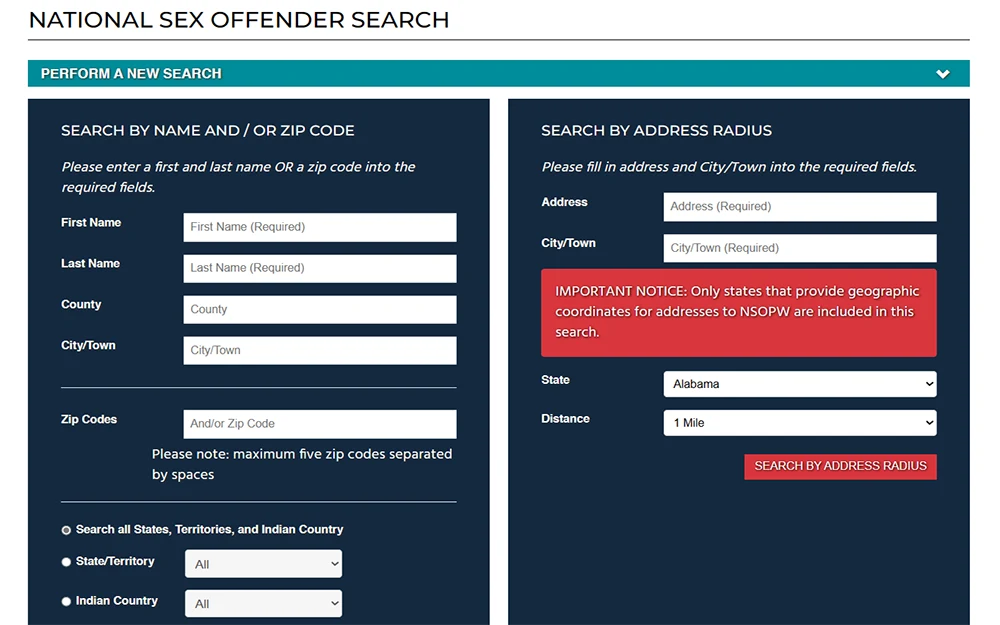
To perform a search, users can use the Florida Department of Law Enforcement’s Sexual Offenders & Predators Search and check by offender, neighborhood, university campus, or an internet identifier search, which are all updated regularly.24
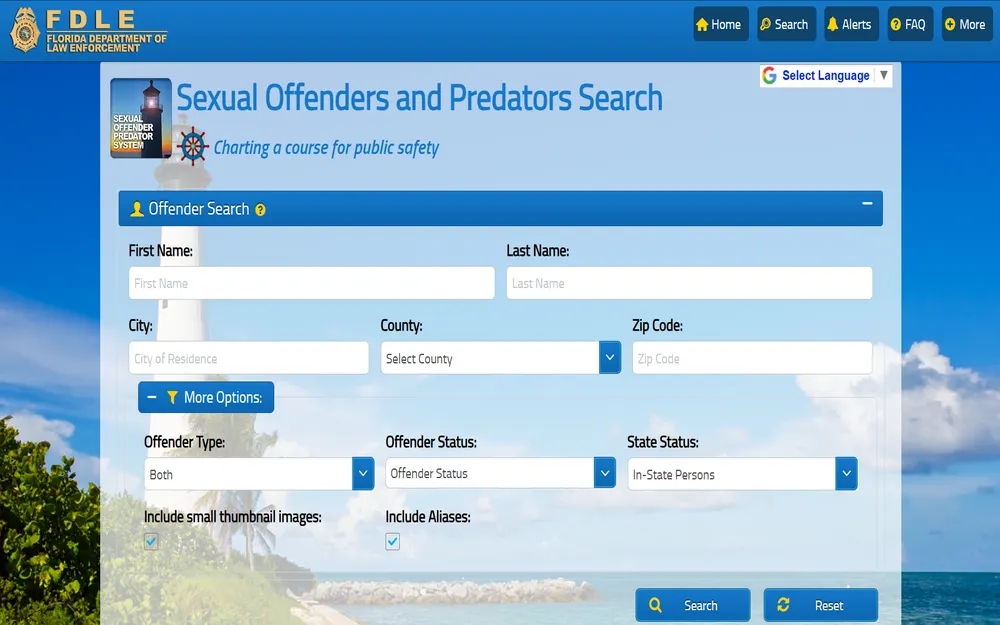
Search results will be shown compiled on the webpage, but users can click “View Flyer” on any offender to view much more in-depth information. Mugshots are shown, and users can also utilize the “Track Offender” function to be notified of any changes to the offender’s location.
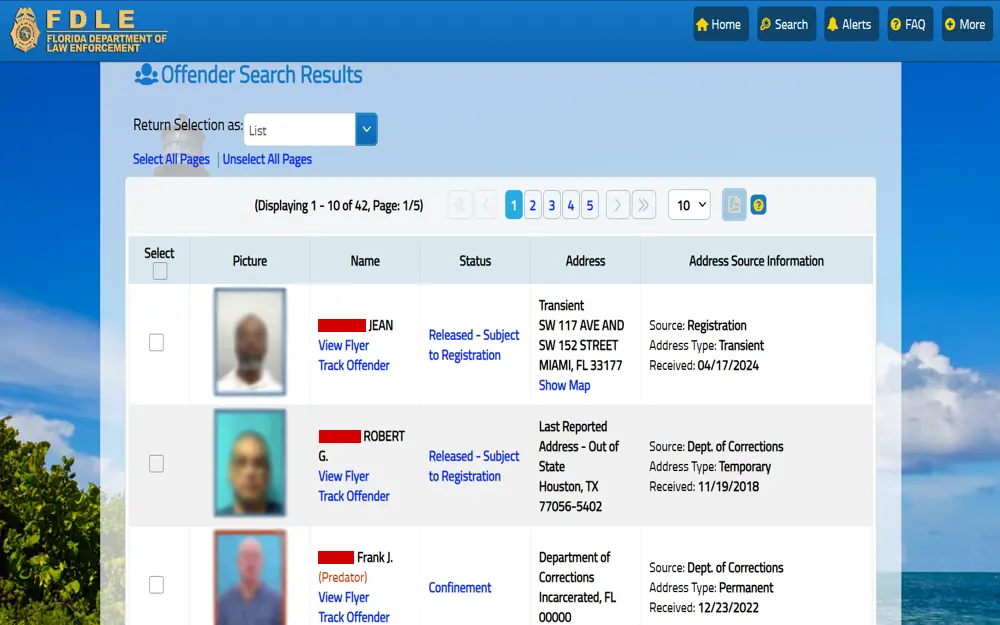
Florida Statutes Pertaining to Criminal & Arrest Records
According to Section 119.011(12) of Florida Statutes, public records are defined as any document, map, book, tape, photograph, audio, software, or other material that is created or received pursuant to ordinance or law in connection with official business or agencies.25
All government records, therefore, are open to the public even if incomplete, as long as the Florida Legislature has not deemed them exempt from disclosure.
All records requests must adhere to state and federal FOIA laws as well, including the aforementioned Florida Open Meetings Law and Florida Sunshine Law found in Chapter 286 of the Florida Statutes.26
Florida has not adopted a statewide ban-the-box law that prohibits employers from inquiring about potential employees’ criminal history until a conditional offer of employment has been granted; however, some cities have moved forward with implementing their own ban-the-box policies. Some such cities include Tampa, Jacksonville, and Orlando, among others.
When performing background and pre-employment checks for work or residency, the Fair Credit Reporting Act (FCRA) must be adhered to; this means that employers, landlords, and others cannot use information contained within to discriminate against individuals.27
Furthermore, the Equal Employment Opportunity Commission provides oversight to U.S. employers, protecting potential employees and applicants by ensuring they are not discriminated against on the basis of race, color, age, ability, sex, national origin, or genetic information.28
While professional background checks require the consent of the individual being investigated, personal background checks can be done without notifying the subject.
In conclusion, Florida arrest records can be accessed by the public through county search tools or law enforcement.
On the other hand, Florida criminal records, informally called rap sheets, provide more information than arrest reports and can be accessed via the counties’ clerk of courts, the Florida Department of Law Enforcement, and third-party people search sites.
Frequently Asked Questions
Does Florida Have a Public Drug Offender Registry?
Florida does not allow public access to a drug offender registry, but Florida’s Prescription Drug Monitoring Program–formally called the Electronic Florida Online Reporting of Controlled Substance Evaluation (E-FORCSE) Program–was initiated in 2009 to encourage safe practices while prescribing or administering controlled substances.
Only prescribers, dispensers and other authorized entities may access the E-FORCSE database or patient information.
Which Agency Is the Criminal Record Custodian in Florida?
Criminal records in FL are held by the Florida Department of Law Enforcement (FDLE) and are accessible to the public by requesting a criminal history record check and submitting the $25 fee.
References
1Florida Legislature. (2023). The 2022 Florida Statutes (including 2022 Special Session A and 2023 Special Session B)286.011 Public meetings and records; public inspection; criminal and civil penalties. Online Sunshine. Retrieved April 13, 2023, from <http://www.leg.state.fl.us/Statutes/index.cfm?Appmode=Display_Statute&URL=0200-0299/0286/Sections/0286.011.html>
2Florida Legislature. (2023). The 2022 Florida Statutes (including 2022 Special Session A and 2023 Special Session B)119.01 General state policy on public records. Online Sunshine. Retrieved April 13, 2023, from <http://www.leg.state.fl.us/Statutes/index.cfm?App_mode=Display_Statute&Search_String=&URL=0100-0199/0119/Sections/0119.01.html>
3Brevard Sheriff. (2023). Brevard County Sheriff’s Office. Brevard Sheriff. Retrieved April 14, 2023, from <https://www.brevardsheriff.com/home/>
4Brevard County Sheriff. (2023). Brevard County Sheriff’s Office Bookings & Inmate Search. Brevard Sheriff. Retrieved April 14, 2023, from <https://www.brevardsheriff.com/bookings/>
5Florida Department of Corrections. (2023). Inmate Telephone System. State of Florida Department of Corrections. Retrieved April 14, 2023, from <http://www.dc.state.fl.us/ci/phone_rates.html>
6ConnectNetwork. (2023). ConnectNetworkGTL. Retrieved April 14, 2023, from <https://web.connectnetwork.com>
7Florida Department of Law Enforcement. (2023). Obtaining Criminal History Information. FDLE. Retrieved April 14, 2023, from <https://www.fdle.state.fl.us/Criminal-History-Records>
8Florida Department of Law Enforcement. (2020). FDLE’s Criminal History Search Overview. FDLE. Retrieved April 14, 2023, from <https://cchinet.fdle.state.fl.us/search/app/default?3>
9Florida Department of Law Enforcement. (2020). Criminal History Services Payment Information. FDLE. Retrieved April 14, 2023, from <https://cchinet.fdle.state.fl.us/search/app/wicket/paymentinfo?13>
10Florida Department of Law Enforcement. (2023). State of Florida Criminal History Record Check. FDLE. Retrieved 14 April, 2023, from <https://www.fdle.state.fl.us/Criminal-History-Records/Record-Check>
11Florida Department of Law Enforcement. (2023). Non-Certified/Certified Search. FDLE. Retrieved April 14, 2023, from <https://shield.fdle.state.fl.us/shield/app/ecorsp?3>
12Florida Department of Law Enforcement. (2023). ORI Search. FDLE. Retrieved April 14, 2023, from <https://shield.fdle.state.fl.us/shield/app/orisearch?2>
13Florida Department of Corrections. (2023). Probation Services. State of Florida Department of Corrections. Retrieved April 14, 2023, from <http://www.dc.state.fl.us/cc/index.html>
14Florida Department of Corrections. (2023). Miami Circuit Office. State of Florida Department of Corrections. Retrieved April 14, 2023, from <http://www.dc.state.fl.us/cc/11.html>
15Federal Bureau of Prisons. (2023). Find an Inmate. BOP. Retrieved April 14, 2023, from <https://www.bop.gov/>
16Florida Department of Law Enforcement. (2023). Seal and Expunge Process. FDLE. Retrieved April 15, 2023, from <https://www.fdle.state.fl.us/Seal-and-Expunge-Process>
17Florida Department of Law Enforcement. (2023). Application for Certification of Eligibility. FDLE. Retrieved April 15, 2023, from <https://web.fdle.state.fl.us/intakeweb/formrenderer.xhtml?pageId=se>
18Florida Department of Corrections. (2023). FDC. Florida Department of Corrections. Retrieved April 15, 2023, from <http://www.dc.state.fl.us/index.html>
19Florida Department of Corrections. (2023). Corrections Offender Network. FDC. Retrieved April 15, 2023, from <http://www.dc.state.fl.us/OffenderSearch/Search.aspx>
20BOP: Federal Inmates By Number. (n.d.). Federal Bureau of Prisons. Retrieved June 16, 2023, from <https://www.bop.gov/inmateloc/>
21Florida Department of Law Enforcement. (2023). The Florida Crime Information Center Public Access System. FDLE. Retrieved April 15, 2023, from <http://pas.fdle.state.fl.us/pas/restricted/PAS/person/WantedPersons.jsf>
22Florida Department of Law Enforcement. (2023, April 3). LiveScan Provider Listing [Web]. FDLE. Retrieved April 15, 2023, from <http://www.fdle.state.fl.us/Criminal-History-Records/Documents/InternetDoc_ServiceProviders.aspx>
23United States Department of Justice. (2023). Dru Sjodin National Sex Offender Public Website. National Sex Offender Public Website. Retrieved April 15, 2023, from <https://www.nsopw.gov/>
24Florida Department of Law Enforcement. (2018). Sexual Offenders and Predators Search. FDLE. Retrieved April 15, 2023, from <https://offender.fdle.state.fl.us/offender/sops/search.jsf>
25Statutes & Constitution :View Statutes :->2010->Chapter 119. (n.d.). Online Sunshine. Retrieved June 16, 2023, from <http://www.leg.state.fl.us/Statutes/index.cfm?App_mode=Display_Statute&URL=0100-0199/0119/0119ContentsIndex.html&StatuteYear=2010&Title=-%3E2010-%3EChapter%20119>
26Statutes & Constitution :View Statutes :->2012->Chapter 286. (n.d.). Online Sunshine. Retrieved June 16, 2023, from <http://www.leg.state.fl.us/statutes/index.cfm?App_mode=Display_Statute&URL=0200-0299/0286/0286ContentsIndex.html&StatuteYear=2012&Title=-%3E2012-%3EChapter%20286>
27Federal Trade Commission. (2023). Fair Credit Reporting Act. FTC. Retrieved April 17, 2023, from <https://www.ftc.gov/legal-library/browse/statutes/fair-credit-reporting-act>
28U.S. Equal Employment Opportunity Commission. (2023). U.S. Equal Employment Opportunity Commission. EEOC. Retrieved April 17, 2023, from <https://www.eeoc.gov/>
29Broward County Clerk of the Courts. (2023). Inmate Information. Retrieved May 18, 2023, from <https://apps.sheriff.org/ArrestSearch/InmateDetail/502102871>
30MDCR Inmate Search. (n.d.). Miami-Dade County. Retrieved June 16, 2023, from <https://www.miamidade.gov/Apps/mdcr/InmateSearch/#/>
31Corrections Offender Network. (2023, May 9). Florida Department of Corrections. Retrieved June 16, 2023, from <http://www.dc.state.fl.us/offenderSearch/detail.aspx?Page=Detail&DCNumber=113573&TypeSearch=AI>
32Florida Department of Law Enforcement. (2018). Sexual Offenders and Predators Search. FDLE. Retrieved May 18, 2023, from <https://offender.fdle.state.fl.us/offender/sops/offenderSearch.jsf>
